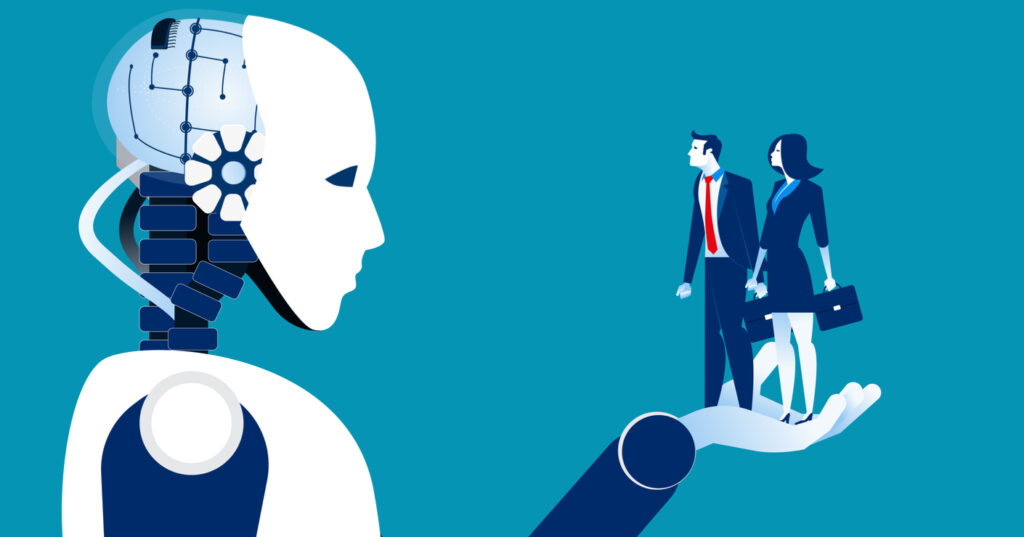Just about 10 years ago, the widespread use of Artificial Intelligence (AI) technologies seemed to be a kind of fantastic thing from sci-fi movies. Today, in 2021, it’s our reality. Although many business processes can be optimized by the integration of AI, the HR function leads this race. This demand is due to the various opportunities these technologies offer for reimagining HR to be more personal, human and intuitive.
What is Artificial Intelligence all about?
Very often, when speaking about technical breakthroughs simplifying our day-to-day life, we use the mysterious word “technologies.” These “technologies” automatically fill our card details when we buy stuff online, speak with us on the behalf of chatbots, generate results of multiple personality tests we do online. However, these are not just abstract “technologies,” these are game-changers that help us think and make decisions!
Here comes the demarcation line: we should not confuse automatization and machines with AI. The latter refers to smart machines that make it possible to learn from experience, adjust to new inputs and perform human-like tasks. These tasks include visual perception, speech recognition, decision-making, translation between languages and so onю In other words, AI stands for the technologies that can also think and analyze like humans.
Projections are impressive: the World Economic Forum forecasts that 75 million current jobs will be displaced as artificial intelligence takes over more routine aspects of work. However, more jobs will be created than eliminated – 133 million new positions are expected to emerge by the end of 2022.
What does it have to do with HR management?
Every HR process is an opportunity for AI: from simple data entry activity to talent acquisition. According to the Gartner 2019 Artificial Intelligence Survey, 17% of organizations use AI-based solutions in their HR function and another 30% will do so in 2022.
Why do they do so?
The same survey by Gartner shows the following:
- 62% of those that have deployed AI aim to improve data-based decision making
- 57% want to improve the employee experience
- 56% want to further automate repetitive or manual tasks
- 51% hope to capture cost savings
And the market is forthcoming to the changes. According to the research by Accenture and the World Economic Forum, 87% of workers believe new technologies like AI will improve their work experience and they are willing to invest their free time to learn new skills in the area.
How AI is reshaping HR management?
1. AI technologies accelerate the screening of candidates and allow to find qualified professionals faster.
Case study: DBS Bank
In May 2018, the DBS Talent Acquisition team created an AI virtual recruitment bot JIM (Jobs Intelligence Maestro) to improve candidates’ screening for the position of wealth planning manager. The company’s recruitment team no longer needed to spend hours to screen thousands of applicants and could devote more time to higher-value work. Recruiters even built a new skill: training JIM to assess applicants and answer their requests.
As a result, the screening time per applicant as shortened from 32 to 8 minutes; the completion rate of job application rose from 85% to 97%; the number of slots of time for recruiters increased so that they could spend more time sharing the culture and values of DBS with candidates (96% of all candidates now interact with JIM at the first stage).
2. AI helps to train uniquely human skills of employees
Case study: Bank of America
Bank of America used AI to create a training program to teach empathy to the banks’ frontline client-facing roles. A total of 40000 employees completed the program to better understand the needs and requests of people coming to the bank. The program taught employees to communicate with people of different statuses and ages, including young parents, widowers, retirees.
Why it was needed? According to Bank of America’s leadership, the training allowed financial consultants to develop emotional intelligence and be more attentive to different customers’ concerns that, in turn, significantly improved the overall job performance of frontline employees.
3. AI and other cognitive computing technologies help to make Learning&Development activities more effective.
Case study: Verizon
Let’s look at another example of cognitive computing in the service of HR departments. Verizon is using Virtual Reality (VR) to train store managers on the protocol in case there is a store robbery. By using this technology, employees learn experiences that previously was almost impossible. The pilot project of such training received absolutely positive feedback that justifies the additional investment in VR over traditional learning and development activities.
4. AI technologies can improve employee experience within a company
Case study: IBM
IBM uses an AI-based tool named Blue Matching to improve career mobility for employees. The technology provides IBMers with personalized job alerts by inferring their skills. This helps to boost their ability to find new internal positions within a company to get the broad experience they need for growth.
As a result, more than 1000 IBMers got the opportunity to advance their skills and land a new role thanks to Blue Matching innovation.
5. AI creates new roles within HR departments
Case study: Salesforce
In 2018, Salesforce announced a new role within its HR function – Chief Ethical and Humane Use Officer – appointing Paula Goldman for this first-ever position. Paula became responsible for monitoring the way the technologies including those related to AI are used in the company. AI collects and analyzes huge amounts of information, creating ethical concerns about its use and trustworthiness. So, the new post of Chief Ethical and Humane Use Officer focuses on developing strategies to use technology in an ethical and humane way.
In fact, more and more companies find new ways to control the use of AI and other technologies to ensure that the results are trustworthy and diffuse fears around them.
Conclusion
How will the HR manager’s work look like in the future? It’s even difficult to suggest, but what we can say for sure is that now we are witnessing major shifts in business processes due to AI development.
An important moment here to understand is that innovations are not replacing us in making crucial decisions or other important responsibilities. Instead, they help us to raise the accuracy and speed of our work. There are beautiful opportunities open up for businesses unless AI technologies are used in an ethical and humane way!



